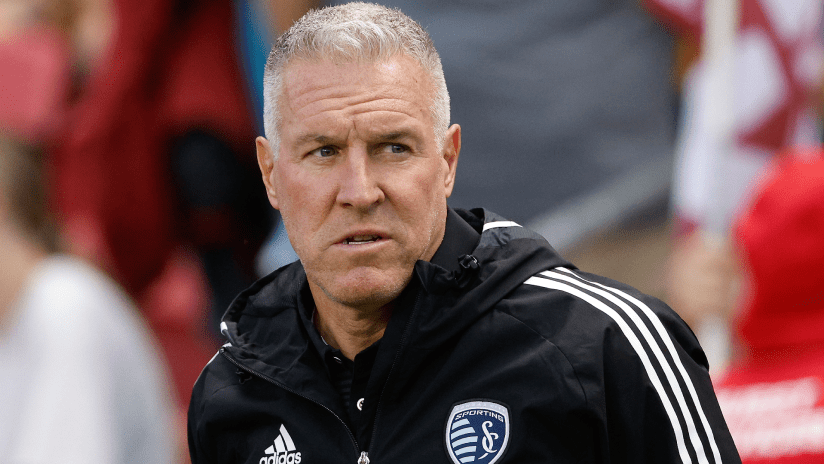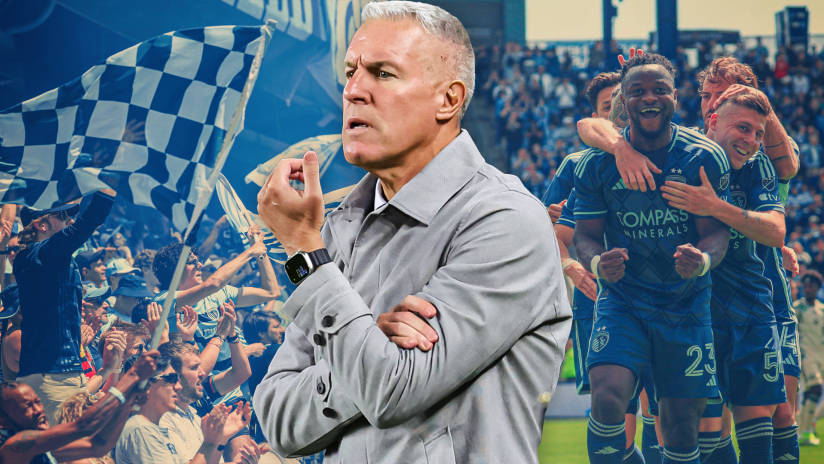On Saturday, Sporting Kansas City will welcome Inter Miami CF for a special occasion at GEHA Field at Arrowhead Stadium, the home of the NFL’s Chiefs and a venue for both this summer’s Copa América and the 2026 World Cup (8:30 pm ET | MLS Season Pass).
It should be a record-breaking occasion, given that ticket sales climbed north of 60,000 almost immediately upon the January announcement that the game would be moved from Children’s Mercy Park in light of Lionel Messi’s potential involvement. SKC’s last visit, a paradigm-shifting friendly vs. Manchester United in 2010, set a new attendance milestone for a professional soccer match in the KC area with a crowd of 52,342.
It’s also a poetic commingling of MLS’s past, present and future. Arrowhead was the original home of SKC, a founding member of the league under their prior incarnation as the Wiz (later the Wizards). Saturday’s match falls 28 years to the day after KC’s inaugural match there in 1996, a game that featured still-familiar faces like Inter Miami chief soccer officer Chris Henderson, Chicago Fire FC head coach Frank Klopas, Preki and Dominic Kinnear (now assistant coaches in Seattle and Cincinnati, respectively).
KC hosting the side that’s rapidly become a poster child of a new era via the potent star power of Messi and his old friends Luis Suárez, Sergio Busquets and Jordi Alba evokes powerful contrasts, particularly with the man in the opposite technical area.
Peter Vermes was in an MLS kit on that opening day back in ‘96 – he wasn’t yet in KC, where he’d finish his playing days, but at the Rose Bowl in Pasadena, California, as a member of the New York/New Jersey MetroStars, today known as the New York Red Bulls. He tells an anecdote about the buildup to that first season that underlines the vast evolution that’s taken the league to its present standing.
“I can remember the first preseason in ‘96,” Vermes recalled to MLSsoccer.com during a one-on-one conversation at a well-appointed Miami hotel during SKC’s 2024 preseason. “The East Coast teams came to Florida; we were in Tampa, I think all five teams stayed at the same hotel, had breakfast, lunch together; the teams organized their own dinners together.
“I was with New York at that time, it was the MetroStars, obviously now it's Red Bull. We had five different Italian restaurants that Charlie Stillitano [New York’s first general manager] had mapped out, and we went to a different one every night. That wasn’t bad, though, I have to say. But yeah, it was a lot different.”
Through the years
The league’s circumstances have changed enormously in so many other ways. It’s nearly tripled in size from 10 members to 29, with No. 30, San Diego FC, debuting next spring, and most play in their own soccer-specific homes rather than the hulking gridiron stadiums required in the ‘90s. Investment in MLS has mushroomed, both in terms of the breadth and diversity of owners and the scale of spending on salaries, infrastructure and more.
Aside from a brief span between the end of his playing days in 2002 and his taking the helm of KC’s technical staff in November 2006 – when he did television work for the San Jose Earthquakes and worked on the US Under-20 men’s national team staff – Vermes, 57, is one of a select few who’ve been a part of nearly all of it.
“Yeah,” he said, with marked understatement, “I've been doing this a long time.”
Vermes is the longest-tenured head coach in MLS, and it’s not close. He’s closing in on his 15th anniversary on the job, nearly five years longer than the second-placed name on the list, Philadelphia’s Jim Curtin, and as noted, his responsibilities as SKC’s chief soccer officer date back even further. Among all major North American pro leagues, he trails only Gregg Popovich, Mike Tomlin, John Harbaugh and Erik Spoelstra.
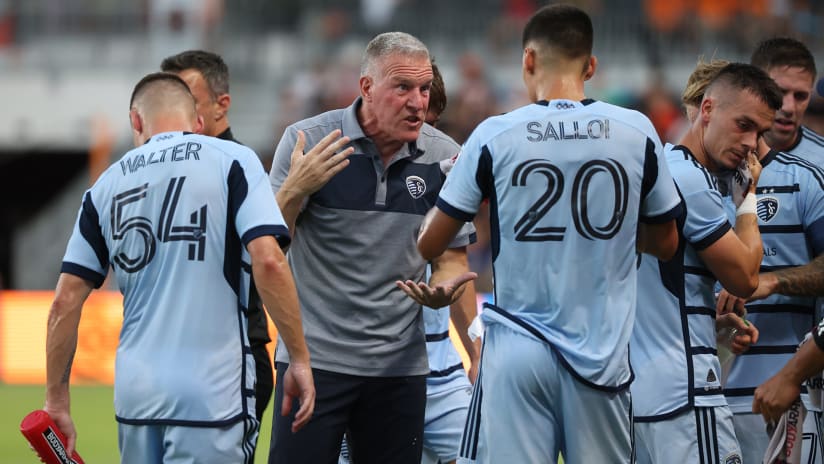
Staying power
When Vermes first arrived in Kansas City, Messi was 12, still an unknown kid back in Rosario, some months away from flying to Spain for the fateful FC Barcelona tryout that would eventually lead to his first professional contract, hastily scribbled on a napkin by Barça scout Carles Rexach.
As coaches have grown more disposable across MLS, leashes shortening as the stakes and expectations rise, Vermes is an outlier, synonymous with his club to an extent matched by few, if any, of his peers. He’s an SKC institution whose leadership predates the organization’s very name, let alone its award-winning stadium and training ground, both of which he helped design. He oversaw the building of SKC’s ambitious academy program. He’s the architect of the 4-3-3-based game model Sporting have played in effectively that whole time.
His staff tends to stick around, too: assistants Kerry Zavagnin and Zoran Savic have been by his side for 15 years. And he retained the trust of ownership even in the depths of a woeful, 10-game winless start to last season that had significant swathes of the fanbase calling for his dismissal.
“In sports, it's very easy to fire the coach, right?” he said. “It's the easy way out.”
This was very much in the realm of possibility a year ago. He harks back to heavy conversations with his superiors, in which he argued that the long-term injuries to Designated Players Alan Pulido and Gadi Kinda (who would return to his native Israel in the offseason) and other key contributors like Tim Melia and Willy Agada were more impactful than any decision he, or they, could make.
“The bottom line is if they would’ve fired me, they still would have had to wait the same amount of time than if I still would have been there, even if they got a new coach, for those players to return back to play,” said Vermes.
“I'm not stupid and I'm not naive to not think that people weren't thinking about that within our organization. But I think it was a great learning lesson for them, whether it's now or in the future, that you’re going to have peaks and valleys within either a season, or also within a term, and you have to determine, are you concerned about the peaks and the valleys, or are you concerned about the direction? The direction never changed.”
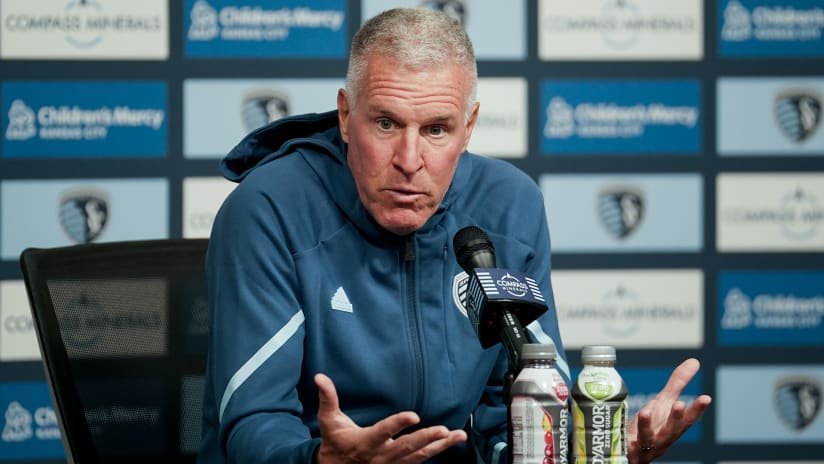
By the time autumn’s chill set in, he would indeed be vindicated.
After notching their first win on May 7 – hard on the heels of a boozy, cathartic, players-only retreat at owner Mike Illig’s ranch – Sporting doggedly hauled themselves up the table as they regained health through the sultry summer months. They then whacked their fellow Midwesterners Minnesota United on Decision Day to book their spot in the Audi MLS Cup Playoffs, where they beat San Jose before upsetting top-seeded St. Louis CITY SC in Round One, a torrid chapter in their new cross-Missouri rivalry.
It was a redemptive recovery, and a satisfying one, even for a member of the National Soccer Hall of Fame with two MLS Cups, three US Open Cups and a Supporters’ Shield on his combined résumé.
“I'm not saying I'm a great coach; I'm not a bad coach. I'm somewhere in between there,” said Vermes, who last year admitted the criticism had awakened his “vengeful” side, the part of him that relishes proving the doubters wrong. “I didn't all of a sudden turn up and forget how to coach in that period of time.
“This past year, I wouldn't say that I wanted to be in that situation. What I would say is that having gone through it, I've learned so many valuable lessons.”
Culture first
That process has been happening for quite some time. You might think all those years in Sporting blue would bleed together after a while. Yet the former US international seems to have a remarkable ability to recall specific periods of seasons and games, even those more than a decade in the past.
He’s learned to take the long view, to sweat the details, to believe in his players. He remembers a time when an undefeated start to a season shuddered to a halt because, in his view, he failed to sufficiently rotate his starting XI for a trip to Portland on short rest.
“I realized that what I didn't do was, I didn't demonstrate trust in the team,” he explained. “And I'm saying that’s the whole team, whole roster, not just the 11 guys.”
He apologized to his squad afterwards, promising to handle things differently the next time. He did just that the following year, reaping good results on a similar travel-heavy stretch of the schedule, and showing his players he’d keep his word. Which is a prime example of “the single most important thing,” the concept he’s come to value more than any other.
“I probably put highest importance on culture,” said Vermes, “and one of the biggest factors in culture is time. … As a coach, the first thing you are with culture is, you’re a used car salesman. You're trying to sell everybody on it.”
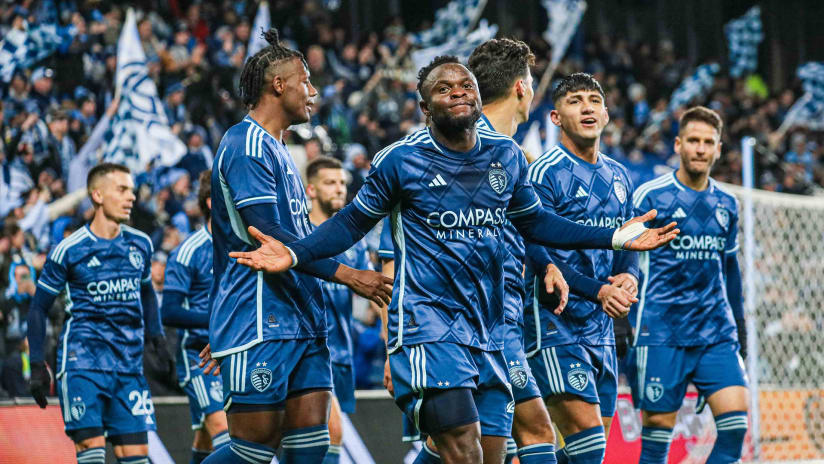
In that regard, he believes most players on a given team can be categorized into “three buckets” for a manager seeking to build a successful collective.
- Bucket 1: “It's the guys that are listening like ‘Man, I've been waiting for this for my whole career, finally it's here, I'm in.’”
- Bucket 2: “Then you go to the extreme, you have this other group like, ‘I've heard this s**t before, this is all bull, it's not happening.’”
- Bucket 3: “Then you have this middle group who are going, ‘You’ve got to show me.’”
A dedicated leader can win over all of Bucket 3, and perhaps a few converts from Bucket 1, yet must also rapidly recognize who won’t buy in, and send them on their way.
“Once you start to get through that piece, now you're using situations to demonstrate the culture. Someone steps in the wrong area, you got to be able to deal with that and deal with it quickly, and also visibly, so that people understand there's a correlation between what you're saying and what you're actually doing, and they see it,” said Vermes. “After a while it starts to become protecting and defending the culture, and then it's where can you evolve in your culture, because it never stays the same. You're either regressing or you're going forward.”
By the accounts of Illig and others, that culture didn’t crumble even in the depths of last year’s woes, with players retaining their belief.
“He's, I would say, Mr. Kansas City,” said Sporting playmaker Erik Thommy of Vermes. “It's always great because he played as a player. Now he's a coach, so he knows exactly what's important for us. Sometimes it's details – maybe one day off, maybe no day off. So these kind of details, he knows it exactly when it's good for us.
“I mean, there's a huge difference,” added Thommy when asked to compare that longevity to his previous experiences back home in Germany. “Because all the former clubs I had, the coach changed all the time. So you have sometimes three coaches in the season. You have to get used to it. That's a different style of systems, how they want to play. That's tough sometimes. So we have here, how I can say, we know exactly what Peter wants from us. So we can train it over weeks, maybe months, to get used to everything.”
Pulido the star
Perhaps the most striking buy-in came from Alan Pulido, the Mexican international who joined SKC from Chivas Guadalajara in a club-record transfer north of $7 million in 2019. Last fall the star striker re-signed an extension through 2026 despite long, frustrating stints on the sidelines due to multiple major injuries, declaring he needed to win hardware before he could contemplate leaving Kansas City.
As indicated by the team’s dramatically better statistics and results with him in the lineup, Pulido remains vital to Sporting’s championship aspirations.
“To me he's an old-school Jaime Moreno – can play multiple positions, can change his game for the opponent that we're playing, or during a game,” said the coach of his attacking spearhead, whom he believes has plenty more left in the tank at age 33. “If he has to go out wide, he gets out wide. If he has to drop off and play more as a false 9, he can do it. If he has to be a target striker, he just can do it. … His injury was bad. I think even the doctors were surprised at how well he came off of it. And I think for us it was, the guy fits us. So we're now going to go out and try to find a new guy?
“He also, in a very short period of time when he first got here, he showed me something you hope and you try to evaluate from a distance. You talk to as many people as you can. But as much as you want to think you know, you never know until you get inside the white lines with a guy, and then you start to find out about really who he is. When he loses, how does he react? When tough moments happen, how does he react? Just all these situations. And it was so fast that he impressed me with how much of a team guy he is, how humble he is, and how much he was there to actually win.”
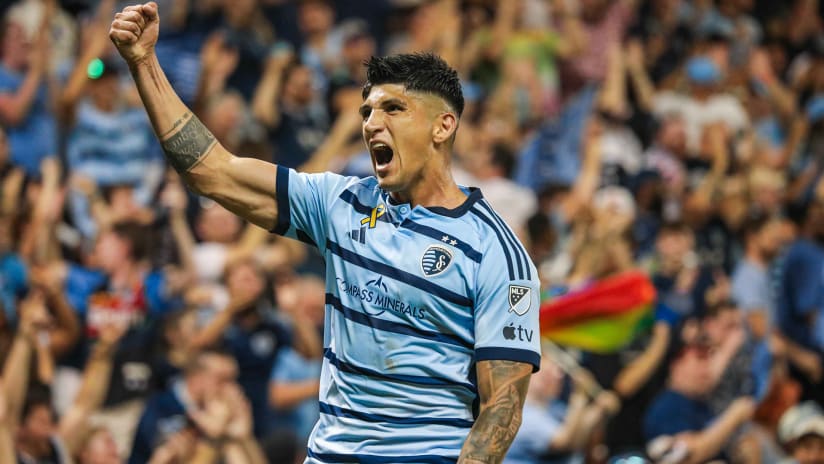
Pulido’s new deal took many months for Vermes, technical director Brian Bliss and Pulido’s representatives to hash out. As obsessively meticulous as he’s always been about his many roles, Vermes says that’s one aspect of the job he’s seeking to remove himself from, preferring to hand it off to Bliss.
“I've separated myself from the money side of it. I have to,” he said. “For the early years, I did all of it. I did contracts, I did everything. I don't think you can do that anymore. I don't think it's a healthy environment between myself and the players if I'm doing your contract as well. Because I think there can be some hard feelings sometimes if you don't get what you want, and all those types of things. I'd rather not be in that.”
While he’s reached a stage of his career at which many move upstairs into more executive roles, Vermes feels more drawn than ever to the hands-on aspect of his work.
“I've always wanted to be a coach. So if I didn't have the on-field side of it, I’d struggle,” he said. “When I first started, I was just doing that [CSO] job and I was so busy. I actually was OK with not coaching, because I was so busy. I was building a training facility, we were trying to look to build a stadium, there was just everything at that time. But those days are beyond all that. Now you got academy, second team, first team, and for me, I'd really like to focus on the soccer side of that and the progression of all those players through our pro player pathway.”
Pro pathway
The myriad regulations that govern the foundation of that pathway are a recurring subject of consternation. Having worked for years to augment SKC’s homegrown talent pool with a wider footprint via MLS’s largest affiliate program, a national scouting apparatus and a residential program for their academy, Vermes chafes at the lingering territorial restrictions on recruiting prospects from other parts of the US and Canada.
“If you're on the East Coast or you're on the West Coast, you maybe have five to 10 players that you're looking at that are in this pool of guys that you think maybe could make it, and you're bringing them in. For us, we're lucky if it's two or three,” he said. “So we’ve got to not only be dead-on center with the decision, but we also have to spend a lot of time to make sure that that player does become successful because of the smaller pool of players.
“The league should be moving towards an environment where I can go to New York, I can go to Jersey, I go to Philadelphia, I go to anywhere in California and recruit players from there to come to Kansas City if they want to. We have to get to that place,” he contended. “The openness would push the envelope in that teams that don't do a good job or are not really committed to the pro player pathway, then let those kids go someplace else. It only makes sense.”
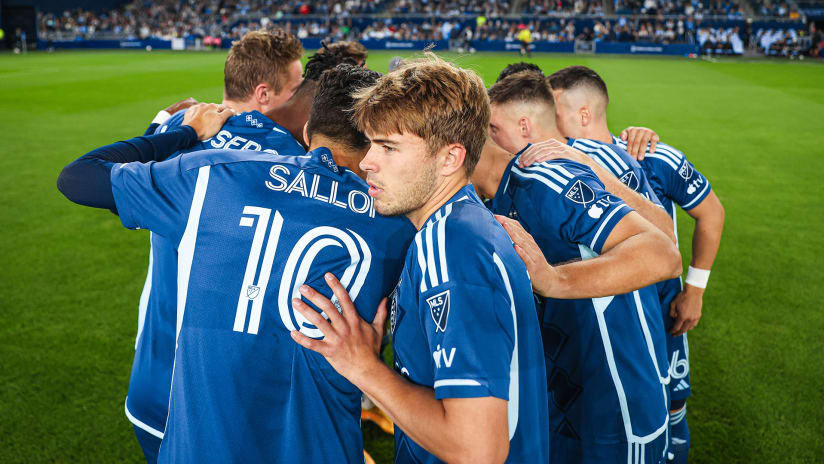
Some of Sporting’s top homegrown products, the likes of Gianluca Busio, Dániel Sallói and Jake Davis, were drawn from locales far afield from KC. The club also innovated a system of compensation for affiliate clubs that help nurture future pros, similar to the Development Grant Program recently adopted across all of MLS NEXT.
“We tried to be innovative to help us because maybe we don't have fertility or we're not a big market or whatever,” said Vermes. “You can still pull more people, more good players into our league. I still think we're missing some, because I think they get shut out and then what happens is it becomes unattainable for clubs like me, later down the road, once they're in their pro player pathway.
“Wouldn't it be better to actually have that kid in the system and actually making it to the top, with a team that actually wants to do that?”
High motivation
There’s a fire that fuels Vermes to immerse himself in these sorts of granular topics – the same fire that is unmistakable in his notorious sideline demeanor during matches. He’s arguably the most animated presence on any MLS touchline, and he says he can’t change that, even after all these years, even when his remonstrations draw the ire of refereeing crews.
“Oh, the intensity is there,” he said. “Times are changing, because I have fourth officials telling me that I have – what did the person say to me, what was it? Oh, ‘you're too passionate.’ I don't know how to do this job if you don't have passion. So I'm not going to deter from being who I am.”
Here he shares another story he’s carried for decades, from when he was just 12 or 13 years old, working as a counselor at a soccer camp back in New Jersey. He worked with two groups of younger children who moved back and forth between sessions run by two different coaches with two noticeably different energy levels.
“What was so evident was how much one of the other coaches, how much impact they had, because of their enthusiasm and passion for the game, changed the mentality, the ambiance of the group from one coach to the other,” Vermes explained.
“There's a lot of coaches I have a lot of respect for, and in other sports as well. And you can steal little things here and there from different people. But at the end, if you try to mimic any of them, your players will figure it out in the first five minutes, and they think you're full of s**t and they won't believe you. You have to be you. When you are you, then that's where belief comes through. And so I won’t change from that perspective.”
That said, he does believe he’s evolved towards a more balanced, patient application of that famous intensity.
“Sometimes when you're young, it's piss and vinegar and you're going nuts, and you're just balls to the wall and you think that's where it's always going to be,” he said, “and it's not always that way.”
Perhaps there were signs of that this week, as Vermes discussed his love for the classic 1980s film “Vision Quest” with a _Kansas City Star_ columnist and marveled at his first up-close glimpses of Messi, whom he scouted for the US U-20s ahead of their tangle with him and Argentina at the 2005 FIFA World Youth Championship, some 20 years ago.
“There’s no team in the world, there’s no coach in the world, that has ever put a game plan in to stop him. No one ever has,” he said on Tuesday. “And I’m not going to be the first guy to figure it out.”
Whatever happens at Arrowhead on Saturday – whether Messi delights, dominates or observes – Vermes’ eyes will sooner or later return to the horizon ahead.
“There's this chipping-away aspect,” he reflected, “and you have to figure out a way, how to find some success along the way with what you have, while you're getting to where you want to be.”
